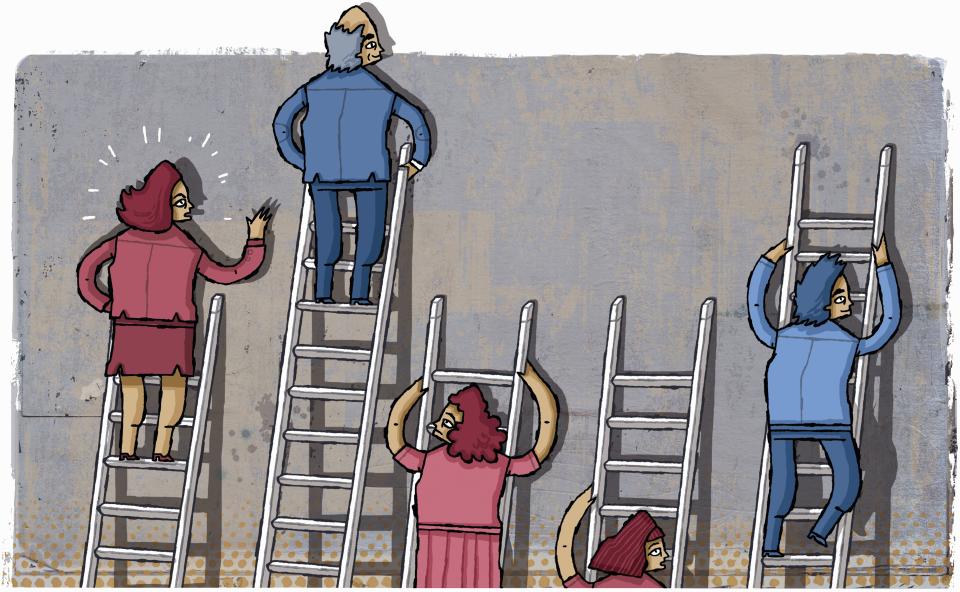Female TV Biz Assistant: Why I Resigned After Making A Discrimination Complaint

With heightened awareness of gender disparities in the entertainment industry, one might think that companies would be extra sensitive to issues of gender discrimination. Based on the specific case of one woman who wanted to tell her story to Deadline, that does not necessarily seem to be the reality. Until she quit last week, Jane (not her real name) was the assistant to the head of scripted development at a company that’s well known for the many TV shows it produces. Last year, she filed an internal gender-discrimination complaint against her boss. She left, she says, because since she filed the complaint, her job only became more difficult and untenable. This is her story, in her own words — a firsthand account of one woman’s battle against the status quo.
“Well, you’ve certainly proven that a woman can do your job.”
Was my boss being sarcastic or did I just time-warp back to 1950, I wondered as I sat in my self-requested performance review. This job was an assistant position; even in the ’50s, women had proven themselves in admin roles.
It wasn’t hard to hide my shock, because after a year of working for my boss, who was the head of the scripted development department at this medium-sized studio, I’d heard him make similar comments. He applauded the fact that he hadn’t heard me crying in the bathroom, something he’d experienced with a previous female assistant. It seemed to me there were a lot of people he liked to rant about (this woman was spineless, that one had no clue what she was doing, etc.).
But I’d also worked in film/TV for seven years, so I knew people such as him were a reality of the entertainment industry. And of course, there are always those who charm the right person and hate on everyone else, or bosses who don’t help their employees grow and expand.
However, I was passionate about developing scripts and believed I had strong story skills, so I pressed on, determined to earn that promotion. I worked weekends, I pored over scripts, and I honed my editing/note-giving skills, hoping my boss would allow me to join a meeting or, you know, do anything of consequence. I asked for more challenging work when it seemed appropriate.
Well, spoiler alert: I didn’t get promoted. My boss said that while I had excellent administrative and organizational skills, I lacked the aptitude to be anything more in the development world, and he would never promote me under his aegis (his words). It made no sense to me. Every good manager knows if someone’s excellent at their current job, you give them more responsibility. Especially if she asks for it. But that was his opinion, so what could I do?
He said he’d happily keep me as an assistant forever, but he knew I wanted more (I wasn’t about to use him as a reference after that, though). From then on, he prohibited me from participating in anything creative, limiting my tasks to straight admin.
I deliberated for a few weeks, consulted a couple of lawyers, and oh yes, cried in the bathroom a lot. Finally, I decided to make a gender-discrimination complaint to the company. Or at the very least, see if they could help.
But what companies and HR people won’t tell you is that making a gender-discrimination complaint is the worst thing you can do for yourself.
At the time, the studio employed upward of 50 people and they had no HR representative, so I had to make my complaint to someone in the legal department.
As I understand it, what happens is they’ll listen, and then they’ll interview other people to see if their stories corroborate yours. OK, that’s fair. I spoke to several female colleagues who validate my complaints.
And then the company talks to the offender, informs him/her of the complaints and perhaps hears the offender’s other side or issues a warning, maybe? I’m not entirely sure, because, of course, they won’t disclose it to the person who made the complaint.
In my case, I begged them not to talk to my boss, because we were a small company and he’d know I was the “complainer.” But they were legally required to let him know a complaint had been made.
A month later, the company informed me they had “handled it.” Not that I needed them to tell me; my boss’ actions told me everything. He stopped cc-ing me on emails, and it felt he was criticizing every task he allowed me to do (which wasn’t much at that point). I was under constant stress, thinking he’d find a reason to fire me, especially because I was so looped out of department correspondence.
Did I have legal grounds for a retaliation case? It didn’t matter. If I took it to court, I’d spend thousands of dollars I didn’t have, after which, even if the case ruled in my favor, I’d get maybe half a year’s salary in recompense and the added “benefit” of being blacklisted from every other entertainment company — because no one wants to hire the complainer or the trouble-maker.
So I kept my head down and looked for another job. In the meantime, my boss received a promotion and, presumably, a big ol’ salary bump.
It left me wondering: What was the point? Standing up for myself and objecting to sexist, unfair statements put me in a worse position. I understand there are two or more truths to every story, and who knows, maybe the company decided this wasn’t gender discrimination. I knew I should take the hit and resign, because nothing would change.
But I don’t accept that this is a productive way to handle gender discrimination. Why are we branding those who dare to step up to a bully boss or a gender discriminator as a complainer? Why should I have to fear that I’ll never be hired in the industry again if I speak out against it or bring in a lawyer?
I’m not saying this to discourage anyone from speaking up if they’re experiencing something similar. I am saying we need change and that, even though I’m scared to tell my story, this can help make people aware of why we have executives with 1950s gender biases still running departments and receiving promotions.
When I consider the way my complaint was handled, it is no surprise to me that Hollywood has the gender gap it does. I have a master’s degree, a strong work ethic and a passion for the industry — and if I can’t move up from an assistant position because of (what I believe to be) a gender issue, I can only imagine how difficult it is for female directors, showrunners and writers.
Just like a script, the gender problem starts behind the scenes and off the screen, with development executives who decide what project gets made and by whom. It starts with production companies and studios that aren’t equipped to handle a complaint. It ends with people speaking out against it.
Get more from Deadline.com: Follow us on Twitter, Facebook, Newsletter



